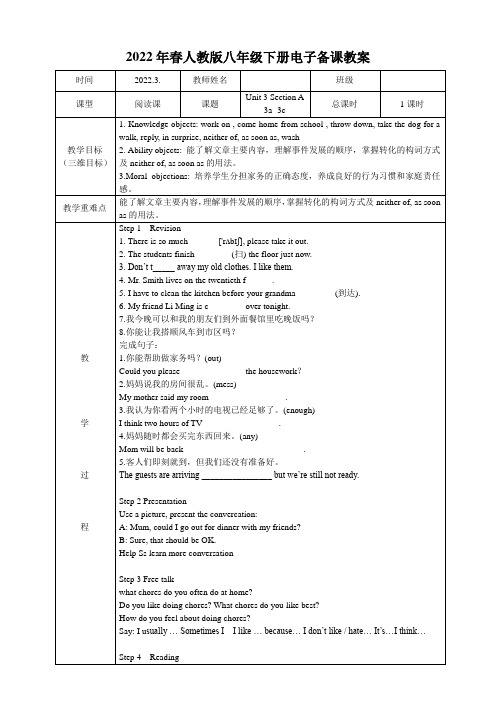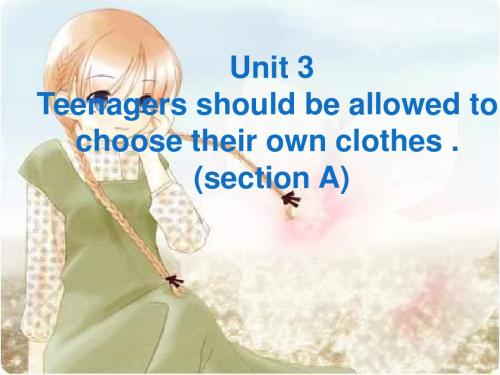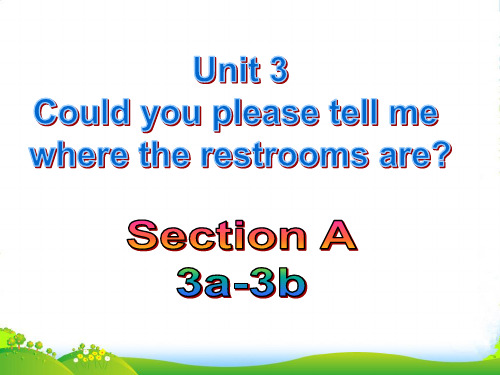Unit3 Section A
Unit 3 Section A (3a -3c)教案人教版英语八年级下册

Step 2 Presentation
Use a picture, present the convercation:
A: Mum, could I go out for dinner with my friends?
Read the story and choose the best answer.
( )1. Who wanted a walk?
A.Nancy’s room B. The dog C. Nancy’s dad D. Nancy
( )2. Nancy came home from ________.
B: Sure, that should be OK.
Help Ss learn more conversation
Step 3Free talk
what chores do you often do at home?
Do you like doing chores? What chores do you like best?
D.Because she got back home late.
( )5. How did they solve the problem?
A.Nancy’s mother said sorry to Nancy.
B.Nancy said sorry to her mother and now she understood she should share the housework.
3.我认为你看两个小时的电视已经足够了。(enough)
Unit 3 Section A (Grammar Focus—3c)

【语法突破】
情态动词can
【观察领悟】 观察下列句子, 思考情态动词can的用法。 ①He can speak English and Chinese well. ②Can you come to my birthday party?
③Can I watch TV this afternoon?
*They like talking about stories.他们喜欢谈论故事。
【自主归纳】talk的用法 talk作不及物动词, 意为“说话, 交谈”。表示与某人说话
时, 应在其后加介词with或to; 要表示谈论什么事物则应在其后
加上介词about。
【妙辨异同】talk, say, speak与tell
【备选要点】
show n.演出;节目
【语境领悟】
v.给„„看;展示
*We want students for the school show. 我们的学校演出需要学生。 *Are there any good shows tonight? 今晚有什么好节目吗? *Please show me your new book.= Please show your new book to me.请让我看看你的新书。
有can, may, must等。情态动词can的用法如下: (一)基本用法 1. 表示“能, 会”, 指脑力或体力方面的“能力”。 例如: Jane can swim but I can’t. 简会游泳, 但我不会。
2. 表示“可能”, 常用于否定句或疑问句中, 指某种可能性。 例如: Can he come here today, please?
【基础达标】 Ⅰ. 单项填空 1. They want singers______ their school show. A. for B. in C. on D. of
Unit 3(单元知识清单)-SectionA七年级英语上册(人教版)_1_1

Unit 3单元知识清单Section A二、知识点清单1. It’s in front of the art building.in front of 在......前面;强调在某人或某物外部的前面in the front of 在......前部;强调在某物内部的前面The girl is in front of the bus.The girl is in the front of the bus.反义词:behind 在......后面2. The student centre is between the library and the gym.between prep. 在......之间,一般指在两者之间,当后面接代词时用宾格。
搭配 between ... and ... 在......和......之间3. What’s your new classroom like, Peter?what’s ... like? ......是什么样子的?用来询问天气情况、事物的外观或人的外貌、性格等。
like此处作介词,意为“像”。
large adj. 大的,大号的多指面积、空间、范围、数量等大big adj. 大的多指体积、程度、分量或重量上的大,其反义词是little或small。
4.Yes, we put up important notices there.put up 张贴;搭建,举起important adj. 重要的常作表语,也可作定语,放在所修饰词前面。
notice v. 注意到;意识到此处可作可数名词,意为“通知”.5.There are some pictures of famous people on the wall.on the wall 在墙上;某物(粘贴)在墙的表面in the wall 在墙上;某物(镶嵌)在墙的内部The clock is on the wall.There is a window in the wall.5. The teacher's desk is in the corner, under/ in front of a window.in the corner 在角落at/ on the corner 在拐角处,在转弯处6.Students sit between/ on chairs at long tables, but today there aren't any students.at a/ the table 在桌子旁边吃饭at table 在吃饭table 供用餐、会谈或消遣娱乐所用,通常没有抽屉。
人教版七年级英语下册Unit3_SectionA_语境法讲解单词

Unit3 SectionA 语境法讲解单词
train /treɪn/ n. 火车
词形、词块拓展
live (1) __l_iv_i_n_g_____________ 派生词(生活;生计)
① _li_v_i_n_g__r_o_o_m_________ 客厅 ② _li_v_i_n_g__e_n_v_i_r_o_n_m__e_n__t 生活环境 ③ _li_v_i_n_g__c_o_n_d_i_t_i_o_n____ 生活条件 ④ _li_v_i_n_g__s_p_a_c_e________ 生存空间;居住面积 ⑤ _m_a__k_e__a_l_i_v_in__g______ 谋生
比较记忆 训练(train)大脑(brain)。
例句 We can catch the early morning train. 我们能赶上凌晨的火车。
train /treɪn/ n. 火车
① The athletes are training for the Olympics.
训练
② You can train your mind to think positively.
练练不忘
①Yang Jiang, a well-known writer, went 10 England for further (far) study
in 1935. ②—We're still expecting a new movie shown in the cinema. — As far as I know (据我所知), there are no more new movies this month. ③My home is not far from here (离这不远), and it won't take me much time to walk home. ④ So far (迄今为止), robots haven't caused any problems. ⑤Honesty is far more important than grade(远比……重要), so don't cheat in exams.
九年级英语全册Unit 3SectionA (3a-3b)

Read the second scene and do true or false.
1. Alice was scared at first. T 2. Alice thinks the new ride is actually fun. T 3. HAelicWeei is very hungry. F 4. He Wei thinks FuWn aTtiemr eCsiPtyark restaurant serves delicious food. F
Listenng task
1. How many scenes(场景) in this conversation? Four.
Scene 1: In Space World Scene 2: After the ride… Scene 3: On the way to Water City Restaurant… Scene 4: Walk up to a staff person at the door
flume ride
merry-goround
Water World
Could you tell me if you have tried these rides in the amusement park? How do you like these rides?
Unit3 Section A 重点单词讲义 英语必修第一册

Unit 2. Family Matters.Section A1.character. n.(书、剧本、电影等中的)人物,角色;性格,特征;文字,符号→adj.characteristic. 独特的,典型的play a character. 扮演角色.a cartoon character. 卡通人物.the main/central/leading character. 主角/中心人物/主要人物a major/minor character. 主要/次要人物.have a strong/weak character. 个性强/弱in/out of character. 符合/不符合个性.Chinese characters. 汉字.in character with… 与….风格相同.be characteristic of…. 是…..的典型特征2.approach. v.走进,靠近,接近;接洽,要求;对付,处理→n. 接近,靠近;方法,方式see/hear sb/sth. approaching. 看到/听到某人/某事正在接近.be easy/difficult to approach. 容易接近/难以接近.approach sb. for advice. 向某人征求意见.approach the problem/matter. 处理问题.the approach of…. …..的来临with the approach of…. 随着…..的来临.an approach to doing sth. 做某事的方法.adopt/take an approach. 采取一种方法.3.turn to. 求助于;转向;翻到turn to sb. for help/advice. 向某人求助/寻求建议.拓展:turn on/off. 打开/关掉.turn down. 调低,拒绝turn up. 调高,出现,被找到turn into. 变成turn over. 翻转;移交turn out. 结果是,证明是4.chat. n/vi. 聊天,闲谈.have a chat with sb. about sth. 与某人闲聊某事.c friendly chat. 友好的聊天.chat with sb. 与某人聊天.chat about.. 闲聊…..cat up. 搭讪5.focus.v.(把….)集中. n.焦点,重点→adj. focused. 专心的,注意力集中的;明确目标的.focus on/upon doing sth. 把注意力集中于做…..be focused on… 专注于…..focus one’s attention/mind/energy on/upon…..把某人的注意力/心思/精力集中于…..focus one’s eyes on… 注视…..become the focus of attention. 成为关注的焦点.the focus of the conference. 会议的重点.come into focus. 成为焦点.bring….into focus. 使…..成为焦点.in focus/out of focus. 焦距对/不对6.in surprise. 吃惊地,惊讶的look up in surprise. 惊讶地抬头看.look at sb. in surprise. 惊讶地看着某人.重点拓展:in+n:表示状态或方式in anger. 生气地in trouble. 在困境中.in safety. 安全地in danger. 在危险中.in public. 公开地in secret. 秘密地.in peace. 平静地in silence. 沉默地.in fashion. 流行in order. 井然有序地7.assume. v.假定,假设,认为→assuming. conj.假定,假设→n. assumption.假定,假设assume that…. 认为…..assume sb/sth to be… 认为某人/某事是…..assume the worst. 往最坏处想。
人教版九年级Unit3 sectionA 课件(PPT)

Talk about the rules according to the pictures.
get your ear pierced pierce 刺穿,刺破
earring
Talk about the rules according to the pictures.
drive a car get your diver’s 执照 license
Talk about the rules according to the pictures.
have a part-time job
Talk about the rules according to the pictures.
not serious not old enough not calm enough
enough(足)够…… (1)enough +名词 enough people/water/time/money (2) 形容词+enough big/tall/serious enough
too wild enough too young too silly
1a
Circle “A” for agree or “D” for disagree.
A D 1. I think teenagers should be allowed to go out with
their friends every night.
A D 2. sixteen-year-olds should be allowed to drive. A D 3. Students should not be allowed to have a part-time job.
人教版九年级英语上册课件:Unit 3 Section A

e.g. I awodnifdferewnhtewreawy.e should go next. Could you tell me where we could go next?
Do you know where we can get some good food quickly? I wonder where we can get some good food quickly. Excuse me, could you tell us when the band starts playing this evening? We’d like to know when the band starts
try doing sth. 表示尝试着做某事 e.g. -- I usually go there by train.
-- Why not try going by boat for a change?
try one’s best 尽某人最大的努力 e.g. Thank you. I will try my best.
WYheys?. The restaurant is always busy, so they should get there early to get a table.
Role-play the conversation.
Underline the questions or
3b statements in the conversation that
Read and tell the sentences true or false.
T 1. Alice and He Wei are in Water World. F 2. The new ride looks scary. T 3. Alice was scary at first. T 4. Alice thinks the new ride is actually fun. F 5. He Wei thinks Fun Times Park restaurant F 6se. rAversocdkelbicainoudspfloaoyds.in Water City Restaurant every F evening.
- 1、下载文档前请自行甄别文档内容的完整性,平台不提供额外的编辑、内容补充、找答案等附加服务。
- 2、"仅部分预览"的文档,不可在线预览部分如存在完整性等问题,可反馈申请退款(可完整预览的文档不适用该条件!)。
- 3、如文档侵犯您的权益,请联系客服反馈,我们会尽快为您处理(人工客服工作时间:9:00-18:30)。
毕菊芳网络教案
(Go for it) Unit3 Section A(1a-1c)
The first teaching period
Teaching content:
Section A 1a,1b,1c
Teaching aims:
知识与能力
1. Master the vocabulary: koala,tiger,elephant,dolphin,panda,lion, penguin,giraffe, zoo, map, cute, smart
2. Master and use: Let’s see the lions.
Why do you want to see the lions?
Because they are cute.
重点
1. The vocabulary.
2. Express preferences and give reasons.
难点
Use the language to express preferences and give reasons.
Teaching procedures:
本课小结
本节课共学习了12个单词,其中包括动物名称,描述性单词等。
并掌握了提出要求及给出原因的句式。
教学探讨与反思
本节课通过反复训练,学生熟练地掌握了所学单词,这和灵活的教学方式密不可分。
对所学知识兴致很高。
板书设计
Unit 3 Why do you like koalas?
Let’s see the lions.
Why do you want to see the lions?
Because they’re cute.
教案所涉及的相关网络资源如下:
/i?
/
/。
